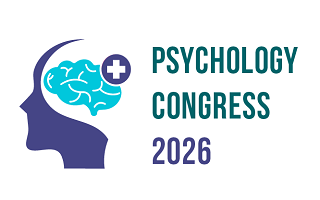3rd International Congress on
Psychology & Behavioral Sciences
March 26-27, 2026 | Osaka, Japan

Address: 5 Chome-3-68 Nakanoshima, Kita Ward, Osaka, 530-0005, Japan.
Psychology Congress 2026

Lusofona University, Portugal
Abstract:
Background: Unmet needs in perinatal mental healthcare are an important public health issue particularly in the context of a stressful life event such as the COVID-19 pandemic but data on the extent of this problem are needed.Aim: To determine the (1) proportion of women with clinically significant symptoms of perinatal depression, anxiety or comorbid symptoms of depression and anxiety, receiving mental healthcare overall and by country and (2) factors associated with receiving mental healthcare.Method: Women in the perinatal period (pregnancy or up to 6 months postpartum) participating in the Riseup-PPD-COVID-19 cross-sectional study, reported on sociodemographic, social support health-related factors, and COVID-19 related factors, and on symptoms of depression (Edinburgh Postnatal Depression Scale [EPDS]) and anxiety (Generalised Anxiety Disorder [GAD-7]) using self-report questionnaires. Clinically significant symptoms were defined as EPDS ≥ 13 for depression and GAD-7 ≥ 10 for anxiety. Mental healthcare was defined as self-reported current mental health treatment.Results: Of the 11 809 participants from 12 countries included in the analysis, 4 379 (37.1%) reported clinically significant symptoms of depression (n = 1 228; 10.4%; EPDS ≥ 13 and GAD-7 < 10), anxiety (n = 848; 7.2%; GAD-7 ≥ 10 and EPDS < 13) or comorbid symptoms of depression and anxiety (n = 2 303; 19.5%; EPDS ≥ 13 and GAD-7 ≥ 10). Most women with clinically significant symptoms of depression, anxiety, or comorbid symptoms of depression and anxiety were not receiving mental healthcare (89.0%). Variation in the proportion of women with clinically significant symptoms of depression and/or anxiety reporting mental healthcare was high (4.7% in Turkey to 21.6% in Brazil). Women in the postpartum (vs. pregnancy) were less likely (OR 0.72; 95% CI 0.59-0.88), whereas women with previous mental health problems (vs. no previous mental health problems) (OR 5.56; 95% CI 4.41-7.01), were more likely to receive mental healthcare. Interpretation: There are high unmet needs in mental healthcare for women with clinically significant symptoms of perinatal depression and/or anxiety across countries during the COVID-19 pandemic. Studies beyond the COVID-19 pandemic and covering the whole range of mental health problems in the perinatal period are warranted to understand the gaps in perinatal mental healthcare.
Biography:
Raquel Costa is Associate Professor at Lusofona University with teaching experience since 2009, and Executive Director of the HEI-Lab. She is Auxiliary Researcher recently awarded (2023) with an individual FCT contract (CEEC) to study brain synchrony and biobehavioral pathways of caregiver-child co-regulation associated with early developmental and mental health problems. She has PhD in Clinical psychology, She have been highly motivated and actively engaged for nearly 15 years in the study of the interaction between environmental and psychophysiological mechanisms, and identification of modifiable risk factors of early psychopathology.
